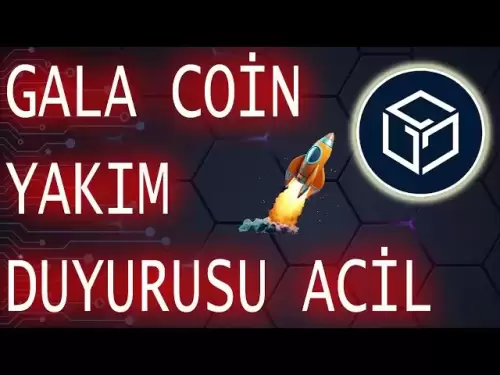-
 Bitcoin
Bitcoin $106,731.2224
-1.05% -
 Ethereum
Ethereum $2,444.9804
-1.20% -
 Tether USDt
Tether USDt $1.0003
0.01% -
 XRP
XRP $2.1882
0.09% -
 BNB
BNB $651.1435
-0.61% -
 Solana
Solana $148.3252
-2.09% -
 USDC
USDC $1.0000
0.01% -
 TRON
TRON $0.2787
0.55% -
 Dogecoin
Dogecoin $0.1598
-3.16% -
 Cardano
Cardano $0.5520
-2.43% -
 Hyperliquid
Hyperliquid $39.0960
-2.64% -
 Bitcoin Cash
Bitcoin Cash $516.9519
2.98% -
 Sui
Sui $2.7011
-2.95% -
 Chainlink
Chainlink $13.0582
-1.71% -
 UNUS SED LEO
UNUS SED LEO $8.9250
-2.53% -
 Stellar
Stellar $0.2359
-0.18% -
 Avalanche
Avalanche $17.3856
-3.73% -
 Toncoin
Toncoin $2.8095
-3.56% -
 Shiba Inu
Shiba Inu $0.0...01121
-1.95% -
 Litecoin
Litecoin $85.2795
-0.85% -
 Hedera
Hedera $0.1471
-2.15% -
 Monero
Monero $319.8004
1.12% -
 Dai
Dai $1.0001
0.01% -
 Ethena USDe
Ethena USDe $1.0001
0.02% -
 Bitget Token
Bitget Token $4.5344
-1.07% -
 Polkadot
Polkadot $3.3224
-2.96% -
 Uniswap
Uniswap $6.9697
-2.75% -
 Aave
Aave $266.1658
-2.25% -
 Pepe
Pepe $0.0...09414
-3.41% -
 Pi
Pi $0.4913
-3.29%
How do I exchange cryptocurrencies in the Exodus wallet?
Exchanging cryptocurrencies in Exodus is user-friendly but be aware of fees and rates; always double-check before confirming to ensure the best deal.
Apr 06, 2025 at 12:49 pm
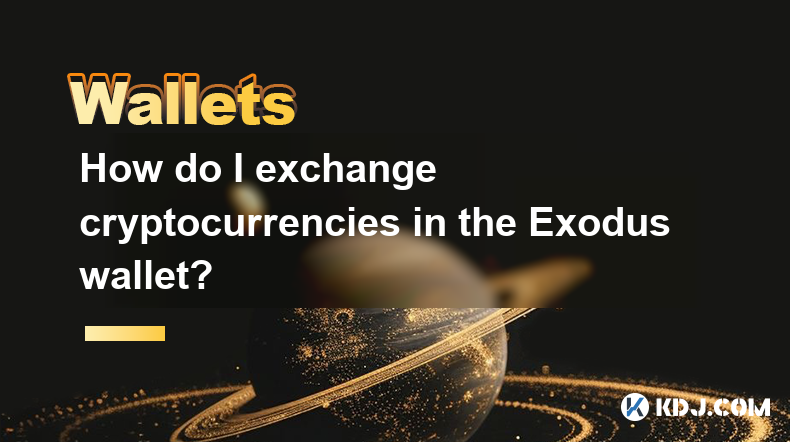
Exchanging cryptocurrencies within the Exodus wallet is a straightforward process that allows users to trade various digital assets directly from their wallet. This feature is particularly useful for those looking to diversify their portfolio or convert one cryptocurrency into another without leaving the security of their wallet. To begin, users need to ensure they have the latest version of the Exodus wallet installed on their device. Once updated, they can access the exchange feature, which is powered by third-party services like Changelly and ShapeShift. This integration ensures that users can enjoy competitive rates and a seamless trading experience.
To start exchanging cryptocurrencies in Exodus, follow these steps:
- Open the Exodus wallet on your device.
- Navigate to the 'Portfolio' section where all your assets are displayed.
- Select the cryptocurrency you wish to exchange by clicking on it.
- Click on the 'Exchange' button, which will direct you to the exchange interface.
- Choose the cryptocurrency you want to receive in exchange for the one you selected.
- Enter the amount you wish to exchange and review the transaction details, including the exchange rate and any fees.
- Confirm the transaction and wait for the exchange to be processed. The time can vary depending on the service provider and network conditions.
It's important to note that while the exchange feature in Exodus is user-friendly, users should be aware of the fees associated with each transaction. These fees can vary depending on the service provider and the type of cryptocurrency being exchanged. Additionally, users should always double-check the exchange rate before confirming the transaction, as rates can fluctuate rapidly in the cryptocurrency market.
Understanding the Exchange Process in Exodus
The exchange process in Exodus is facilitated through partnerships with reputable third-party services. This means that when you initiate an exchange, Exodus sends your request to these services, which then handle the actual conversion of your cryptocurrencies. The process is designed to be as seamless as possible, with Exodus providing a user-friendly interface to manage the entire transaction. However, users should be aware that the availability of certain cryptocurrencies for exchange can vary based on the service provider's offerings.
When using the exchange feature, it's crucial to understand that the transaction is not instantaneous. The time it takes to complete an exchange can vary, typically ranging from a few minutes to several hours. This delay is due to the need for the third-party service to process the transaction and for the blockchain networks involved to confirm the transfers. Users should plan their exchanges accordingly, especially if they need the exchanged funds within a specific timeframe.
Security Considerations When Exchanging Cryptocurrencies
Security is a paramount concern when dealing with cryptocurrencies, and Exodus takes several measures to ensure the safety of your assets during exchanges. The wallet uses a non-custodial approach, meaning that your private keys are never shared with third parties, including the exchange services. This significantly reduces the risk of your funds being compromised during the exchange process.
However, users should still exercise caution. Always ensure that you are using the official Exodus wallet and that your device is free from malware. It's also advisable to enable two-factor authentication (2FA) on your Exodus account to add an extra layer of security. Additionally, be wary of phishing attempts and never share your private keys or recovery phrase with anyone.
Fees and Rates in Exodus Exchanges
When exchanging cryptocurrencies in Exodus, users need to be aware of the fees involved. These fees are typically composed of two parts: the service fee charged by the third-party exchange provider and the network fee required for the blockchain transaction. The service fee can vary depending on the provider and the type of cryptocurrency being exchanged, while the network fee is determined by the current congestion of the blockchain network.
To get the best rates, it's advisable to compare the rates offered by different service providers within Exodus. The wallet allows you to see the rates from multiple providers, helping you choose the most favorable option. Keep in mind that rates can fluctuate rapidly, so it's important to review the rate before confirming your exchange. Additionally, some providers may offer better rates for larger transactions, so consider this when planning your exchanges.
Common Issues and Troubleshooting
While the exchange feature in Exodus is designed to be user-friendly, users may occasionally encounter issues. One common problem is delays in the exchange process, which can be caused by high network congestion or issues with the third-party service provider. If you experience a delay, it's best to wait patiently and check the status of your transaction on the blockchain explorer.
Another issue users might face is an error during the exchange process. This can be due to insufficient funds, incorrect wallet addresses, or technical glitches. If you encounter an error, double-check all the details of your transaction and ensure that you have enough funds to cover the exchange and any associated fees. If the problem persists, you can reach out to Exodus support for assistance.
Maximizing the Benefits of Exchanging in Exodus
To maximize the benefits of using the exchange feature in Exodus, users should stay informed about the latest developments in the cryptocurrency market. Keeping an eye on market trends and news can help you make more informed decisions about when to exchange your cryptocurrencies. Additionally, consider diversifying your portfolio by exchanging into different assets, which can help mitigate risk.
Another way to enhance your experience is by regularly updating the Exodus wallet to the latest version. Updates often include improvements to the exchange feature, such as new service providers or enhanced security measures. By staying up-to-date, you can ensure that you have access to the best possible exchange rates and the most secure environment for your transactions.
Exploring Advanced Features in Exodus
Exodus offers several advanced features that can enhance your experience with the exchange feature. One such feature is the ability to set up recurring exchanges, which can be useful for those looking to dollar-cost average into a particular cryptocurrency. To set up a recurring exchange, navigate to the exchange interface, select your desired cryptocurrencies, and choose the frequency of the exchange.
Another advanced feature is the ability to use the Exodus mobile app for exchanges on the go. The mobile app offers the same functionality as the desktop version, allowing you to manage your portfolio and execute exchanges from your smartphone. This can be particularly useful for those who need to make quick decisions based on market movements.
Common Questions and Answers
Q: How do I start exchanging cryptocurrencies in Exodus?
A: To start exchanging cryptocurrencies in Exodus, open the wallet, go to the 'Portfolio' section, select the cryptocurrency you want to exchange, click on the 'Exchange' button, choose the cryptocurrency you want to receive, enter the amount, review the transaction details, and confirm the exchange.
Q: What are the fees associated with exchanging cryptocurrencies in Exodus?
A: The fees for exchanging cryptocurrencies in Exodus include a service fee charged by the third-party exchange provider and a network fee required for the blockchain transaction. These fees can vary depending on the provider and the type of cryptocurrency being exchanged.
Q: How long does it take to complete an exchange in Exodus?
A: The time it takes to complete an exchange in Exodus can vary, typically ranging from a few minutes to several hours. This depends on the processing time of the third-party service and the confirmation time on the blockchain networks involved.
Q: Is it safe to exchange cryptocurrencies in Exodus?
A: Yes, exchanging cryptocurrencies in Exodus is safe as the wallet uses a non-custodial approach, meaning your private keys are never shared with third parties. However, always ensure you are using the official Exodus wallet and enable two-factor authentication for added security.
Q: Can I exchange any cryptocurrency in Exodus?
A: The availability of cryptocurrencies for exchange in Exodus depends on the offerings of the third-party service providers. Not all cryptocurrencies may be available for exchange at all times, so it's best to check within the wallet for the current options.
Q: How can I get the best exchange rates in Exodus?
A: To get the best exchange rates in Exodus, compare the rates offered by different service providers within the wallet. Keep an eye on market trends and consider the size of your transaction, as some providers may offer better rates for larger exchanges.
Q: What should I do if I encounter an issue during an exchange in Exodus?
A: If you encounter an issue during an exchange in Exodus, double-check all transaction details and ensure you have sufficient funds. If the problem persists, you can reach out to Exodus support for assistance.
Disclaimer:info@kdj.com
The information provided is not trading advice. kdj.com does not assume any responsibility for any investments made based on the information provided in this article. Cryptocurrencies are highly volatile and it is highly recommended that you invest with caution after thorough research!
If you believe that the content used on this website infringes your copyright, please contact us immediately (info@kdj.com) and we will delete it promptly.
- Crypto Rollercoaster: Bitcoin, Altcoins, and the Wild Ride Ahead
- 2025-07-02 07:10:16
- Meme Coins Mania: Arctic Pablo Leads the New Crypto Pack
- 2025-07-02 06:30:11
- Meme Coins on the Move: Arctic Pablo, Bone ShibaSwap, and the Quest for the Next Big Thing
- 2025-07-02 06:30:11
- Crypto ETF Approval: Grayscale's Win & the SEC Rule Change
- 2025-07-02 07:10:16
- Toncoin's Price Wobbles: Engulfing Candle Holds the Key?
- 2025-07-02 07:15:11
- Crypto ETFs: Navigating the US Market Path and SEC Considerations
- 2025-07-02 06:50:12
Related knowledge
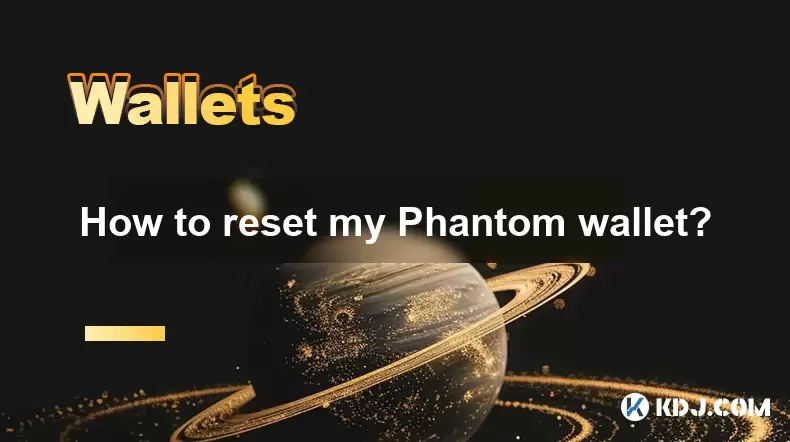
How to reset my Phantom wallet?
Jul 02,2025 at 12:36am
Understanding the Need for Resetting Your Phantom WalletIf you're using a Phantom wallet, you may encounter situations where resetting your wallet becomes necessary. This could be due to forgotten passwords, seed phrase issues, or account corruption. Phantom is a non-custodial wallet primarily used for interacting with the Solana blockchain, and it stor...
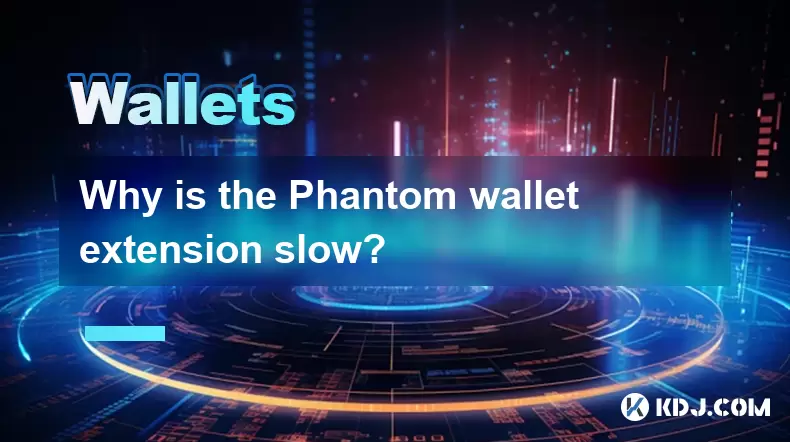
Why is the Phantom wallet extension slow?
Jul 02,2025 at 04:15am
Phantom Wallet Extension: Why Is It Slow?Phantom wallet is a widely used browser extension for interacting with decentralized applications (dApps) on the Solana blockchain. Despite its popularity, some users report that the Phantom wallet extension runs slowly at times. This article delves into potential reasons behind this performance issue and provide...
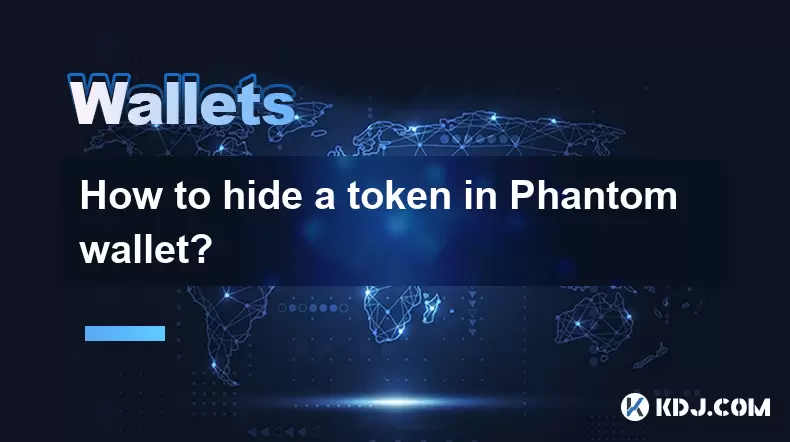
How to hide a token in Phantom wallet?
Jul 01,2025 at 05:49pm
Understanding the Phantom Wallet InterfacePhantom wallet is a popular non-custodial wallet used primarily for interacting with the Solana blockchain. It allows users to store, send, receive, and manage various tokens, including both fungible and non-fungible tokens (NFTs). Before attempting to hide a token, it's essential to understand how the wallet in...
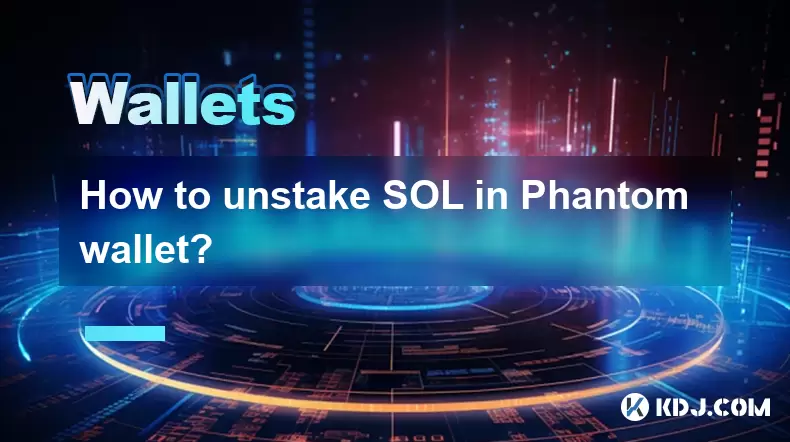
How to unstake SOL in Phantom wallet?
Jul 02,2025 at 06:49am
What Is Staking SOL in Phantom Wallet?Staking SOL involves locking up your SOL tokens to support the Solana network and earn rewards. The Phantom wallet, a popular non-custodial wallet for Solana, allows users to stake their SOL directly from the interface. When you stake SOL, it becomes temporarily unavailable as it is delegated to a validator. This pr...
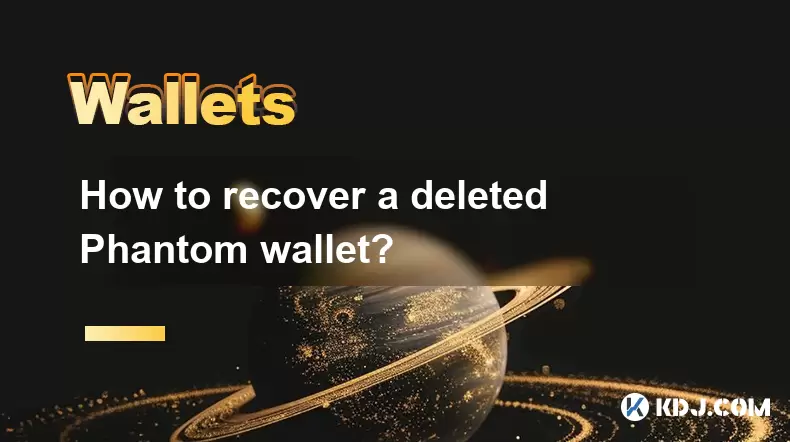
How to recover a deleted Phantom wallet?
Jul 02,2025 at 04:49am
What is a Phantom wallet?Phantom wallet is a popular non-custodial cryptocurrency wallet primarily used for interacting with the Solana blockchain. It allows users to store, send, receive, and manage digital assets like SOL tokens and NFTs. As a browser extension and mobile app, it provides a seamless interface for developers and traders alike. Since it...
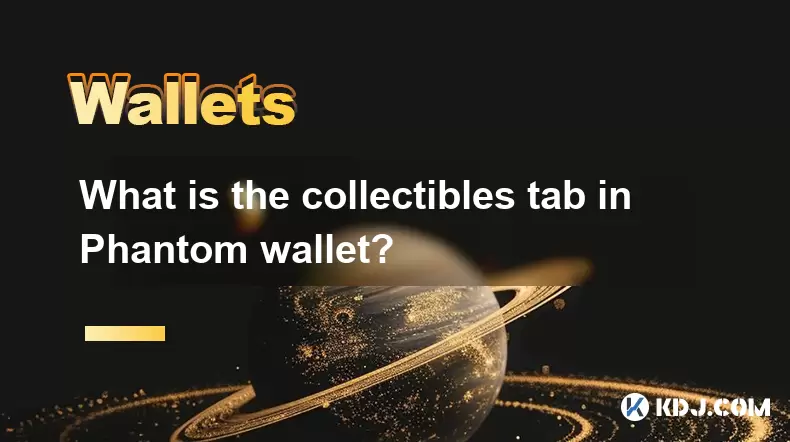
What is the collectibles tab in Phantom wallet?
Jul 02,2025 at 07:21am
Understanding the Collectibles Tab in Phantom WalletPhantom wallet is a non-custodial cryptocurrency wallet primarily used for interacting with the Solana blockchain. It allows users to store, send, and receive SOL tokens, as well as manage various types of digital assets including SPL tokens and NFTs (Non-Fungible Tokens). One of the key features withi...

How to reset my Phantom wallet?
Jul 02,2025 at 12:36am
Understanding the Need for Resetting Your Phantom WalletIf you're using a Phantom wallet, you may encounter situations where resetting your wallet becomes necessary. This could be due to forgotten passwords, seed phrase issues, or account corruption. Phantom is a non-custodial wallet primarily used for interacting with the Solana blockchain, and it stor...

Why is the Phantom wallet extension slow?
Jul 02,2025 at 04:15am
Phantom Wallet Extension: Why Is It Slow?Phantom wallet is a widely used browser extension for interacting with decentralized applications (dApps) on the Solana blockchain. Despite its popularity, some users report that the Phantom wallet extension runs slowly at times. This article delves into potential reasons behind this performance issue and provide...

How to hide a token in Phantom wallet?
Jul 01,2025 at 05:49pm
Understanding the Phantom Wallet InterfacePhantom wallet is a popular non-custodial wallet used primarily for interacting with the Solana blockchain. It allows users to store, send, receive, and manage various tokens, including both fungible and non-fungible tokens (NFTs). Before attempting to hide a token, it's essential to understand how the wallet in...

How to unstake SOL in Phantom wallet?
Jul 02,2025 at 06:49am
What Is Staking SOL in Phantom Wallet?Staking SOL involves locking up your SOL tokens to support the Solana network and earn rewards. The Phantom wallet, a popular non-custodial wallet for Solana, allows users to stake their SOL directly from the interface. When you stake SOL, it becomes temporarily unavailable as it is delegated to a validator. This pr...

How to recover a deleted Phantom wallet?
Jul 02,2025 at 04:49am
What is a Phantom wallet?Phantom wallet is a popular non-custodial cryptocurrency wallet primarily used for interacting with the Solana blockchain. It allows users to store, send, receive, and manage digital assets like SOL tokens and NFTs. As a browser extension and mobile app, it provides a seamless interface for developers and traders alike. Since it...

What is the collectibles tab in Phantom wallet?
Jul 02,2025 at 07:21am
Understanding the Collectibles Tab in Phantom WalletPhantom wallet is a non-custodial cryptocurrency wallet primarily used for interacting with the Solana blockchain. It allows users to store, send, and receive SOL tokens, as well as manage various types of digital assets including SPL tokens and NFTs (Non-Fungible Tokens). One of the key features withi...
See all articles





















